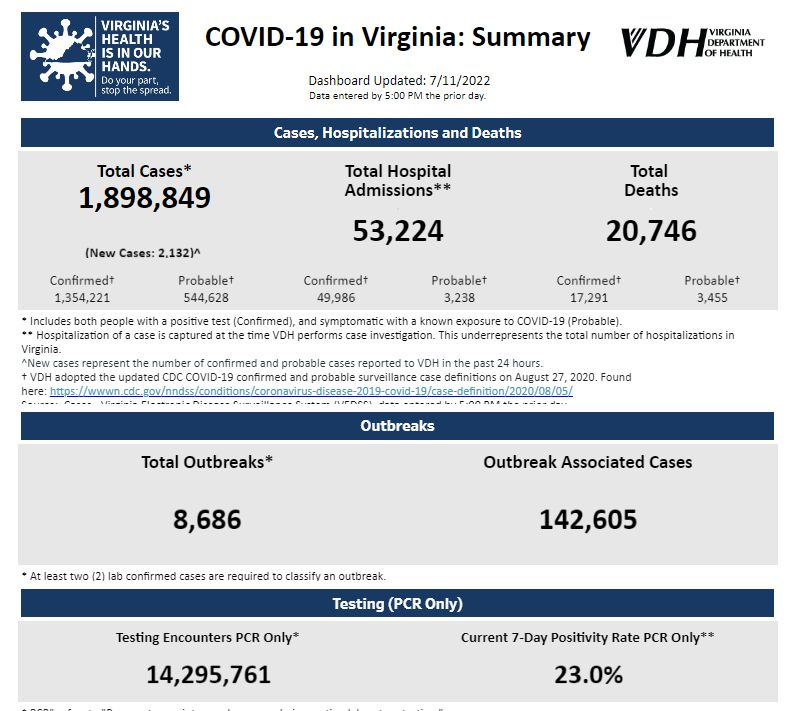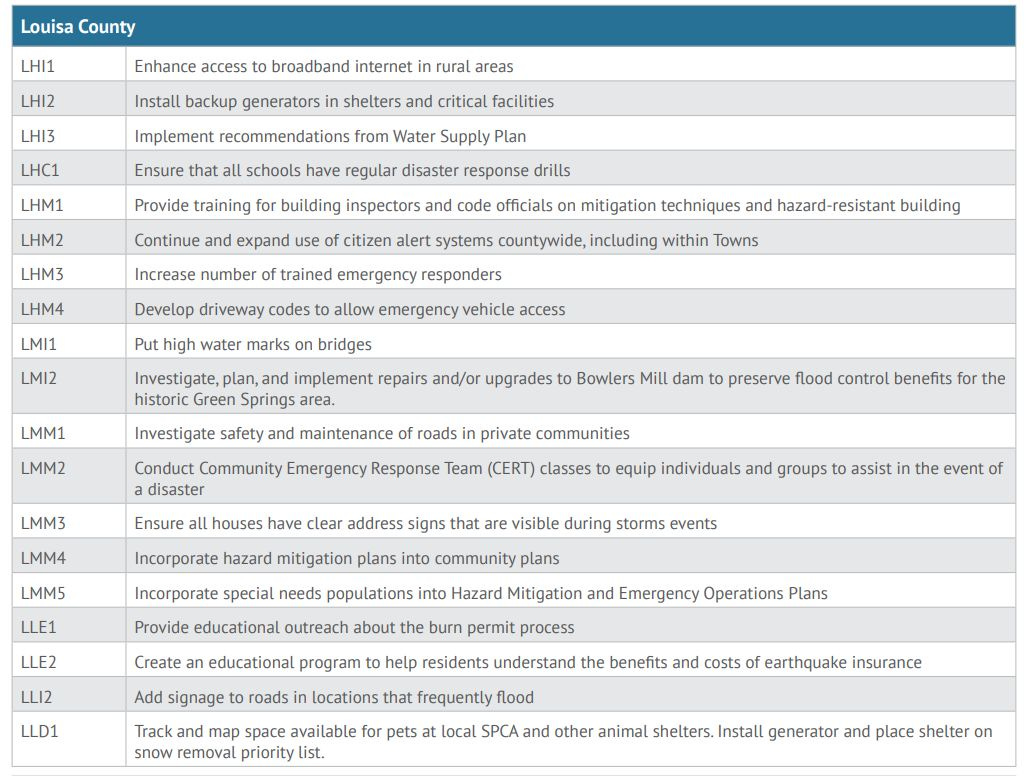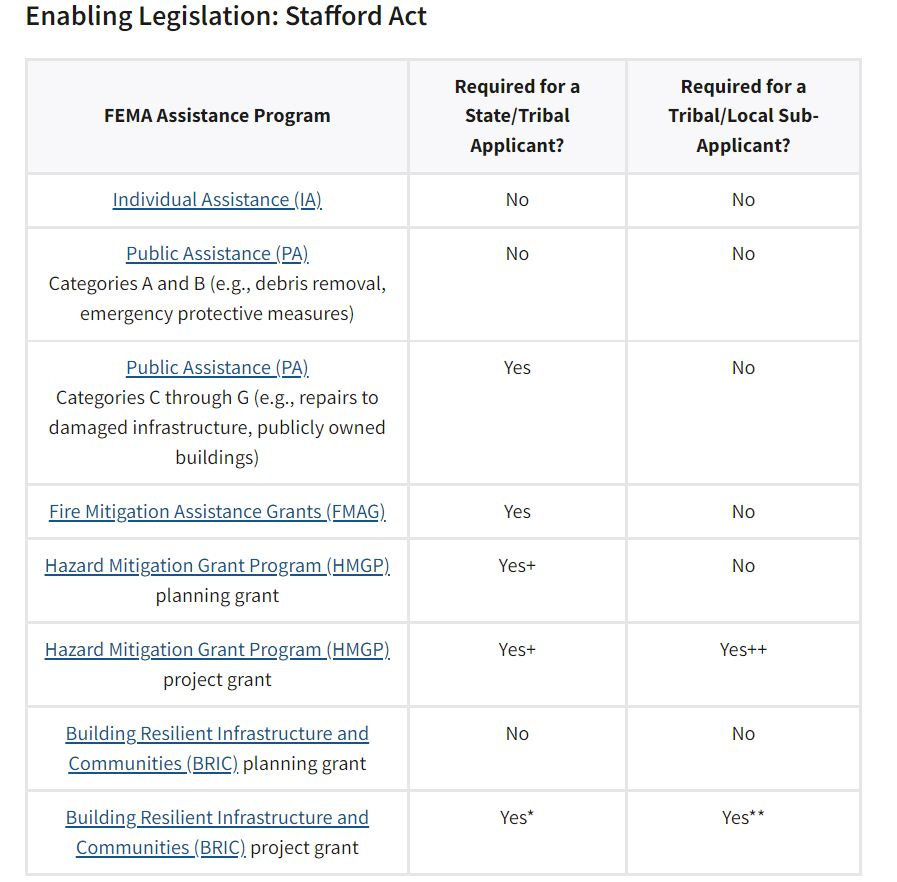Hear ye, hear ye, oyez, oyez, and all that jazz! Welcome to the 192nd day of the year, which is also somehow International Town Criers Day so I am honored to be here to present to you another installment of Charlottesville Community Engagement, a publication that enters its third year with this this 406th installment. I’m your host Sean Tubbs, ready to bring you as much information as I can, updating what it means to be a town crier in these fragmented times.
On today’s program:
An update on COVID in Virginia as the BA.5 Omicron variant wave continues
Louisa County’s Board of Supervisors gets a briefing on a Regional Hazard Mitigation Plan but want to know more about its purpose
UVA will ask to demolish an apartment complex from the 1940’s with no specific plans for the future of the 4.1 acre property
A long-time official with the Charlottesville Fire Department now works for Albemarle
And an audio piece funded by the Charlottesville Sister Cities’s Commission makes it debut
First shout-out: The Plant Northern Piedmont Natives Campaign
Since the very beginning of this newsletter, one long-time Patreon supporter has used his shout-out to draw your attention to the work of the Plant Northern Piedmont Natives Campaign. The campaign is a coalition of grassroots partners including motivated citizens and volunteers, partner organizations, and local governments who want to promote the use of native plants. Summer is in high gear and pollinators are active! Want to learn more? Visit plantvirginianatives.org to download Piedmont Native Plants: A Guide for Landscapes and Gardens.
COVID cases in Commonwealth continue to be prevalent with BA.5 wave
The Virginia Department of Health reports another 2,132 new cases of COVID today as measured through the PCR tests conducted in health-care settings. The seven-day average of positive tests is now at 23 percent.
“We are seeing quite a lot of community transmission of COVID-19,” said Dr. Patrick Jackson is an infectious disease expert at the University of Virginia Health System. “The numbers listed, the number of infections in the community, are going to be artificially low because so many people are doing hometesting and those don’t get into that pot.”
Dr. Jackson said this is a similar pattern to what was seen during the early days of the Omicron wave last fall. He said what’s known as the BA.5 variant is not leading to as many hospitalizations or deaths.
“It is encouraging that the numbers of bad outcomes don’t seem to be going up nearly as we’ve seen in previous waves,” Dr. Jackson said. “So this does look to be another period of time in which many people will become infected with COVID-19, become symptomatic with COVID-19, but probably would not expect to see another big wave of hospitalizations or deaths from this virus.”
Dr. Jackson said it still makes sense for people to try to avoid the virus by getting boosted and by wearing masks while indoors, especially if you are immunocompromised.
“If you’re going to be masking, I certainly would use a high-quality mask to try to get as much benefit out of that as possible,” Dr. Jackson said. “No face in making your face warm to no good end.”
For more information on vaccinations and boosters, visit the Blue Ridge Health District’s website.
University Gardens slated for demolition
An apartment complex on U.S. 29 built in 1948 and owned by the University of Virginia since the early 1960’s will be torn down rather than renovated.
“The University Gardens buildings have reached the end of their useful life and UVA Housing and Residence Life (HRL) has determined the best course of action is demolition since maintenance and operating expenses have escalated to a level where continued operation is no longer economically viable,” reads a fact-sheet for the development.
Necessary repairs included upgrades to electric systems, roof replacements, and HVAC improvements.
A plan to demolish the structures will be presented to the Board of Visitors in September. Demolition would take place early next year and the space will be converted to parking.
“There are no immediate plans for redevelopment at this time,” the fact-sheet continues.
The Board of Visitors’ next regular meeting is scheduled for September 15.
Albemarle Fire Rescue hires Charlottesville veteran for new deputy chief
There’s a new deputy chief of community risk and resilience at Albemarle County Fire Rescue. Emily Pelliccia was named to the position earlier this month after serving 28 years with the Charlottesville Fire Department.
"Deputy Chief Pelliccia has a proven track record of success in establishing collaborative relationships with government officials, businesses, and community members that will be vital as our department grows to meet the needs and challenges of the developing community we serve,” said Albemarle County Fire Rescue Chief Dan Eggleston in a news release.
Pelliccia began her career as a volunteer with the Charlottesville-Albemarle Rescue Squad. According to the release, she has served as “Firefighter, EMT, Captain, Battalion Chief, Deputy Chief, Emergency Manager, Hazmat Technician, SWAT Paramedic, and Health & Wellness Director.”
In the new position, Pelliccia will oversee the Fire Marshals’ Office and Community Engagement. She’s been in the new role since June 21.
Sister Cities Commission funded sound project debuts
Charlottesville’s Sister Cities Commission exists to encourage cultural exchanges between our portion of the 38th parallel with four communities across the globe. Or five, if you count Pleven, Bulgaria.
One of the communities is Poggio a Caiano in Italy, and yesterday a new audio piece funded by a grant from the Sister Cities Commission debuted.
Charlottesville musicians Wes Swing and Kelley Libby traveled to Poggio this March to record sounds and local music. The result is a 32 minute piece called Storie Musicali, Italian for Musical Stories. The work also includes songs and sounds recorded in Charlottesville, and the two are blended together into one soundscape.
Take a look on YouTube:
Second shout-out: WTJU staging the Cville Puzzle Hunt on August 27
In today’s second Patreon-fueled shout-out: By now, readers and listeners know WTJU’s position on algorithms. But do you know that the radio station celebrates puzzles? In fact, on Saturday, August 27, WTJU is organizing the Cville Puzzle Hunt, a huge, cerebral puzzle that will spool out across downtown Charlottesville. The Cville Puzzle Hunt will take you and a team of friends on a wild afternoon running around trying to untangle five diabolical, large-scale puzzles inserted into the urban landscape. The opening clue will be read at 1 p.m. at the Ix Art Park. Find out more about this WTJU-organized event at cvillepuzzlehunt.com.
Louisa Supervisors briefed on Regional Hazardous Mitigation Plan, push back on incomplete data
The Thomas Jefferson Planning District Commission continues work on a document that’s intended to coordinate regional responses to natural disasters and other calamities. Ian Baxter of the TJPDC presented to the Louisa Board of Supervisors last week. (read the draft plan)
“So the plan itself is essentially to prepare for natural disasters,” Baxter said. “We’re lookint to reduce loss of life, property damage, and disruption of commerce. I think I should reiterate before I get into the weeds, so we’re serving the six localities that comprise the Planning District.”
Baxter initially said such plans were required by the Federal Emergency Management Agency as a condition of eligibility for some of its grant programs, but he would later clarify that information after the meeting. More on that below.
Baxter said the plan is based on an analysis of the most likely disasters. The categories of Hurricanes/highwind/windstorms, flooding, and winter storms all rank as the highest probabilities for this region.
Before Baxter’s presentation, several members of the public complained about a flooding problem in the town of Louisa. One Supervisors noted there were specific mitigations for each locality, but wondered how that might apply to an ongoing situation.
“What does this document do for us?” asked Supervisor R.T. “Toni” Williams o
“That’s a great question,” Baxter said. “The action items sort of serve as a base for what localities might engage in. These are aspirational. They’re not tied to implementing all of these mitigation action items. What it does for you is give you a good blueprint for what you can hope to accomplish over the next five years.”
Baxter said having the plan in place would allow federal funding to flow after a disaster. Williams was skeptical of this approach.
“It gives us access to funding after said disasters happen,” Williams said. “Because we have a mitigation plan. Just because we have one. We don’t have to do anything with it. It just sat on the shelf and because we spent money creating a plan, that gives us access to mitigation funds after a disaster happens. That just seems totally backwards to me.”
Williams said he was not interested in what plans are for other communities in the area, but wanted to know what it could do for Louisa.
Supervisor Bill Adams said he was concerned about data from the National Climate Data Center on page H-14 that summarizes the number of floods since 2010 and the amount of damages reported. Albemarle reported $50,000 whereas Greene reported $4.777 million.
“And most other counties didn’t report anything,” Adams said. “We just heard people here talking about…. Mrs. Woolfork was talking about the $25,000 to their driveway, I’ve been to their house, I know their driveway, and I know the culverts they’re talking about replacing. It says here this data came from the National Climate Data Center. Obviously it’s not complete. Where do they get their data?”
Baxter said he did not know where the data came from, but that the TJPDC relies on the data coming from the federal government.
Williams said he wanted a work group to be convened of Louisa officials including town officials to see if they can mitigate flooding on a specific portion of Beaver Creek.
“In my mind that would be money well spent with the TJPDC,” Williams said.
The working group will be formed and the draft plan will return to the Board.
Baxter sent an email sent to Louisa Supervisors after the meeting to clarify something in his presentation.
I misspoke when I described what the hazard mitigation plan provides eligibility for in terms of mitigation grants. In fact, a variety of pre-disaster grants are open to localities that adopt a Hazard Mitigation Plan, and most post-disaster eligibility is not contingent on the adoption of a plan (so, the County would still be eligible for disaster relief even without an adopted plan). Please see the chart below:
Thanks to Tammy Purcell of Engage Louisa for her help with a fact-check in this story.
Support the program!
This is episode 406 of this program and it contains stories you’re simply not going to see anywhere else. At least, a style you won’t find except here and Information Charlottesville. Town Crier Productions is not a nonprofit organization, but around a third of the audience has opted to contribute something financially. It’s similar to the old days when you would subscribe to a newspaper. I subscribe to several, myself!
If you are benefiting from this newsletter and the information in it, please consider some form of support. I am not a nonprofit organization and most of my time is spent in putting the newsletter together, which includes producing the podcast.
Supporting the program through a Substack contribution or through Patreon makes it very easy for me to get paid and every single dollar that I get makes me want to work that much harder to serve the community. In just under two years, I’ve produced hundreds of stories that seek to give you information about how decisions are made in our community and in the Commonwealth of Virginia.
For more information on all of this, please visit the archive site Information Charlottesville to learn more, including how you too can get a shout-out! Thank you for reading, and please share with those you think might want to learn a few thing or two about what’s happening.





















Share this post